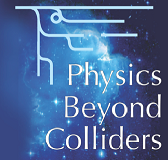Speaker
Description
Searches for dark-matter (DM) candidates in the MeV to few-GeV mass range feebly interacting with SM particles are generating much interest: as suggested by different authors, thermal relics due to these long-lived particles might account for the observed DM abundance in the universe. Provided NA62 reaches its limiting sensitivity for the precise measurement of the ultra-rare FCNC K+ —> pi+ nu nu-bar decay, in 2021 and beyond its setup might be well suited for exploring different DM scenarios. In particular, after possible minor modifications to the apparatus, a one-year run in beam-dump mode should allow sensitivity in as-yet unexplored regions for various SM extensions. Different new-physics models can be tested, including those based on a new vector field mediator of a new U(1) force and coupled with the ordinary hypercharge (A’ or “dark” photon), those built including a set of three sterile heavy neutrinos (heavy neutral leptons), and those based on axion-like particles (ALP’s). Moreover, running with the charged kaon beam and using dedicated trigger strategies, a thorough test of lepton-flavour violation from three-track K+ decays can be pursued, which will improve on the present results by two orders of magnitude. On general grounds, this sensitivity corresponds to probing mediators of several hundreds of TeV in flavour-blind new-physics scenarios. Other possible channels that could be investigated with the current NA62 setup after minor modifications to the beam setup are under study, as well.
The result of preliminary feasibility studies and a set of minor possible modifications to the experimental setup will be discussed. The impact of these searches at NA62 after few years of run starting in 2021 will be compared to that of other initiatives in the field that are planned, approved, or running.
